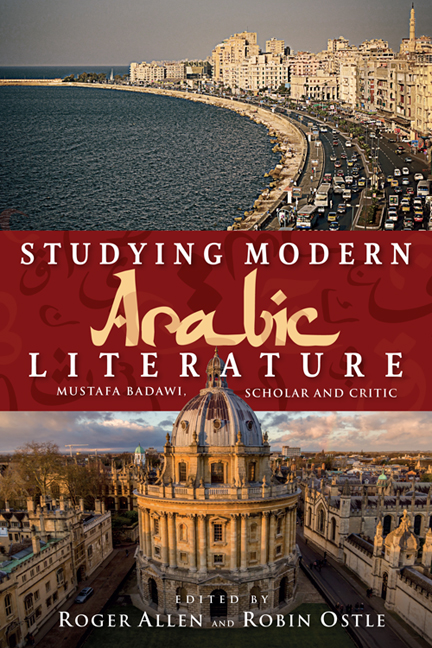Book contents
- Frontmatter
- Contents
- List of Figures
- Introduction
- Part I Alexandria to Oxford
- Part II The Academic Legacy
- 5 Beginning and End: Exploring the Qur'anic ‘Grand Story’
- 6 Modern Arabic Literature as Seen in the Late Nineteenth Century: Jurji Murqus's Contribution to Korsh and Kirpichnikov's Vseobshchaya Istoria Literatury
- 7 The ‘Second Journey’ (Al-Rihla al-thaniya) of Muhammad al-Muwaylihi's Hadith 'Isa Ibn Hisham Revisited
- 8 Ataturk Becomes 'Antar: Nationalist-vernacular Politics and Epic Heroism in 1920s Egypt
- 9 Jewish Arabs in the Israeli Asylum: A Literary Reflection
- 10 Strange Incidents from History: Youssef Rakha and his Sultan's Seal
- 11 Towards a Comparative Approach to Arabic Literature
- 12 Does Literature Matter? The Relationship between Literature and Politics in Revolutionary Egypt
- Notes on the Contributors
- Index
9 - Jewish Arabs in the Israeli Asylum: A Literary Reflection
from Part II - The Academic Legacy
Published online by Cambridge University Press: 05 August 2016
- Frontmatter
- Contents
- List of Figures
- Introduction
- Part I Alexandria to Oxford
- Part II The Academic Legacy
- 5 Beginning and End: Exploring the Qur'anic ‘Grand Story’
- 6 Modern Arabic Literature as Seen in the Late Nineteenth Century: Jurji Murqus's Contribution to Korsh and Kirpichnikov's Vseobshchaya Istoria Literatury
- 7 The ‘Second Journey’ (Al-Rihla al-thaniya) of Muhammad al-Muwaylihi's Hadith 'Isa Ibn Hisham Revisited
- 8 Ataturk Becomes 'Antar: Nationalist-vernacular Politics and Epic Heroism in 1920s Egypt
- 9 Jewish Arabs in the Israeli Asylum: A Literary Reflection
- 10 Strange Incidents from History: Youssef Rakha and his Sultan's Seal
- 11 Towards a Comparative Approach to Arabic Literature
- 12 Does Literature Matter? The Relationship between Literature and Politics in Revolutionary Egypt
- Notes on the Contributors
- Index
Summary
In the 1950s two of Mustafa Badawi's Jewish students left Iraq for Israel. Life in Baghdad had become untenable for Sasson Somekh and David Semah, and they made the perilous trip to the young Zionist state. There they learned Hebrew and became integrated into the predominantly Ashkenazi culture. However, unlike many of their Mizrahi Jewish contemporaries, they held on to their mother tongue and nurtured their interest in Arabic literature and culture. During the late 1960s and early 1970s, both pursued their doctorates on Egyptian men of letters under the supervision of Mustafa Badawi. Sasson Somekh analysed the early novels of Najib Mahfuz, and David Semah focused on the Egyptian critics 'Abbas Mahmud al-'Aqqad, Muhammad Husayn Haykal, Taha Husayn and Muhammad Mandur. In 1973, Brill published Somekh's dissertation with the title The Changing Rhythm and a year later they brought out Semah's Four Egyptian Literary Critics. Both went on to pursue distinguished careers in the Israeli academy. This chapter examines the lives and writings of a few Mizrahi intellectuals who, like Badawi's students, succeeded despite the challenges they faced as Jewish Arabs.
In 2002, an Iraqi Muslim named Samir (b. 1955) directed Forget Baghdad, a documentary about Iraqi writers in Israel. Having heard so much about the Jews and the role they had played in his country, he wanted to know what happened to them after they left in the 1950s. How had they been welcomed and how were they living in the Jewish state?
‘They bought us,’ responds Samir Naqqash (1938–2006). ‘We became their slaves … They sent us back 100,000 years.’ Author of five collections of stories, three plays and four novels, Naqqash was one of the last Iraqis in Israel to write in Arabic.
Reliving his traumatic encounter with Hebrew, Shimon Ballas (b. 1930), Professor of Arabic literature at Haifa University, recalls: ‘I tried to forget Arabic, not to read a single letter.’ Then one night in the 1960s Arabic exacted her revenge by bombarding him with words and phrases that kept him sleepless until morning. Since then he has written in Hebrew, but ‘carried’ Arabic with him wherever he goes. Author of ten works of fiction – including The Transit Camp (1964) – he has also produced several Hebrew translations and studies of modern Arabic literature.
- Type
- Chapter
- Information
- Studying Modern Arabic LiteratureMustafa Badawi, Scholar and Critic, pp. 139 - 158Publisher: Edinburgh University PressPrint publication year: 2015



